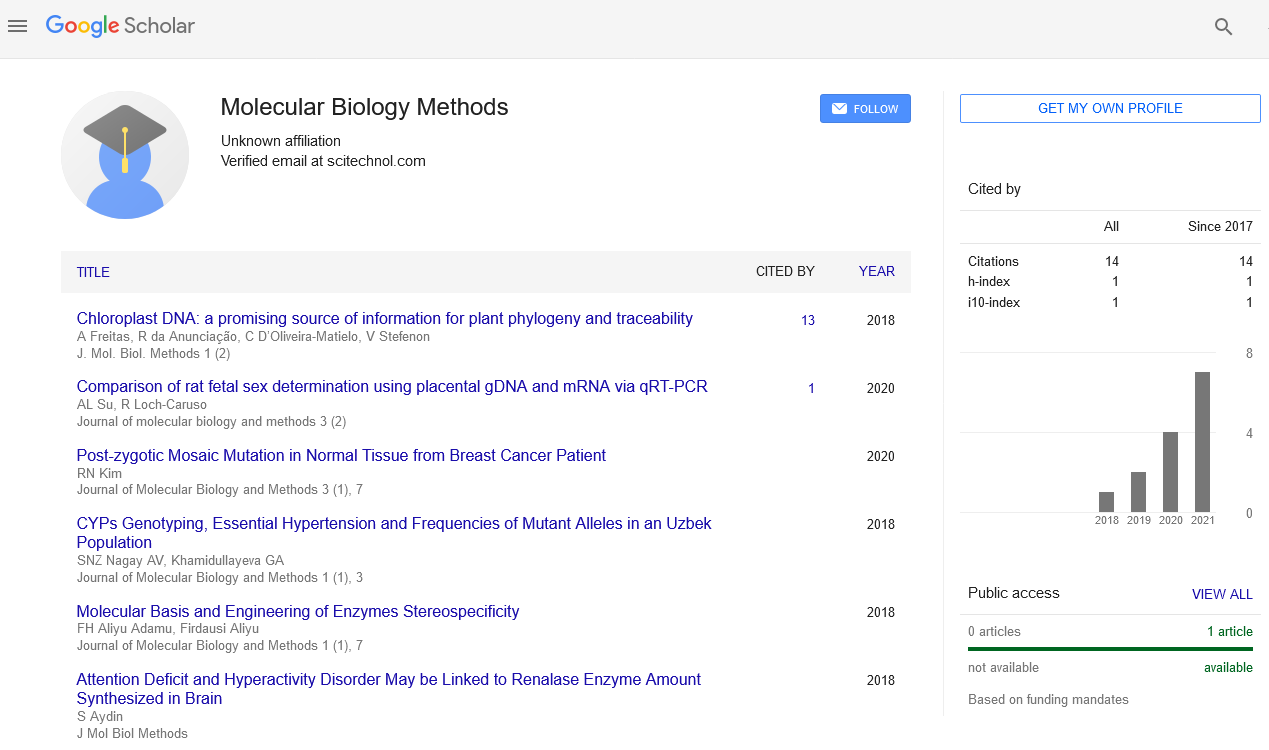Perspective, J Mol Biol Methods Vol: 7 Issue: 1
An Overview on Genetic Engineering: Applications and Ethical Considerations
Francisco Castello*
1Department of Biology, John Watson Hall Queen's University, Kingston, Canada
*Corresponding Author: Francisco Castello,
Department of Biology, John Watson
Hall Queen's University, Kingston, Canada
E-mail: castellofrancisc@edu.ca
Received date: 26 February, 2024, Manuscript No. JMBM-24-136936;
Editor assigned date: 29 February, 2024, PreQC No. JMBM-24-136936 (PQ);
Reviewed date: 14 March, 2024, QC No. JMBM-24-136936;
Revised date: 21 March, 2024, Manuscript No. JMBM-24-136936 (R);
Published date: 28 March, 2024, DOI: 10.4172/JMBM.1000155
Citation: Castello F (2024) An Overview on Genetic Engineering: Applications and Ethical Considerations. J Mol Biol Methods 7:1.
Description
Genetic engineering stands at the frontier of modern biotechnology, offering unprecedented power to manipulate the fundamental building blocks of life. It's a multidisciplinary field that merges principles from genetics, molecular biology, biochemistry, and computational biology to modify organisms' genetic material, unlocking a realm of possibilities previously confined to the realms of science fiction.
At its core, genetic engineering involves altering an organism's DNA sequence, either by introducing foreign genes or by editing existing ones. This manipulation can result in the expression of desired traits, such as increased crop yield, disease resistance, or even the production of valuable pharmaceuticals.
Applications of genetic engineering
Genetic engineering has far-reaching implications across diverse fields, including agriculture, medicine, industry, and environmental conservation.
Agriculture: In agriculture, genetic engineering has led to the development of genetically modified crops with enhanced traits such as pest resistance, herbicide tolerance, and improved nutritional content. These crops offer the potential to increase yields, reduce reliance on chemical pesticides, and address global food security challenges.
Medicine: Genetic engineering holds tremendous promise in medicine, enabling the development of novel treatments for genetic disorders, cancer, and infectious diseases. Gene therapy, for example, involves introducing therapeutic genes into patients' cells to treat or prevent disease, offering hope for previously incurable conditions.
Industry: In the industrial sector, genetic engineering is employed to produce a wide range of valuable products, including enzymes, biofuels, pharmaceuticals, and biodegradable plastics. Microorganisms engineered to express specific enzymes or metabolites can serve as efficient biocatalysts for industrial processes, offering sustainable alternatives to traditional manufacturing methods.
Environmental conservation: Genetic engineering offers innovative solutions to environmental challenges, such as pollution remediation, conservation of endangered species, and restoration of damaged ecosystems. Engineered microorganisms can be deployed to degrade environmental pollutants, while genetic interventions may help preserve biodiversity and restore degraded habitats.
Ethical considerations
While genetic engineering holds immense potential for advancing human welfare and scientific knowledge, it also raises profound ethical questions and concerns. Key ethical considerations include: Safety: Ensuring the safety of genetically modified organisms and products is paramount to prevent unintended consequences, ecological disruptions, and potential harm to human health.
Equity: The equitable distribution of the benefits and risks of genetic engineering technologies is essential to address social disparities and prevent exacerbating existing inequalities. Environmental impact: Assessing and reducing the environmental impact of genetically modified organisms is important to safeguard ecosystems, biodiversity, and ecosystem services.
Informed consent: Respecting individuals' autonomy and ensuring informed consent in the use of genetic engineering technologies, particularly in clinical applications and human subject’s research, is essential to uphold ethical standards and protect human rights.
Genetic engineering represents a paradigm change in our ability to understand, manipulate, and builds the power of life's molecular machinery. While offering unprecedented opportunities to address pressing challenges in agriculture, medicine, industry, and the environment, genetic engineering also raises profound ethical, social, and environmental considerations that must be carefully navigated. By embracing a rich and responsible approach, we can unlock the full potential of genetic engineering to shape a more sustainable, equitable, and strong future for humanity and the planet.
 Spanish
Spanish  Chinese
Chinese  Russian
Russian  German
German  French
French  Japanese
Japanese  Portuguese
Portuguese  Hindi
Hindi 